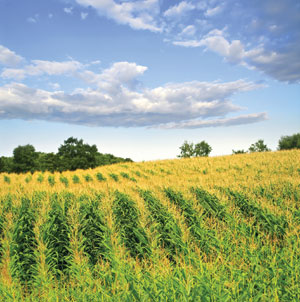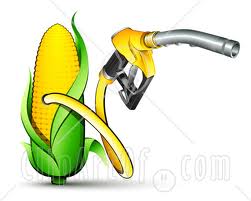Vocabulary Biomass- an organic material generated from plants and animals. Feedstock- any raw material used to make ethanol Biofuels- any fuel that is derived from biomass. Ethanol- most widely used biofuel today. Biodiesel- a clean burning alternative fuel that is made from domestic renewable resources. Biomass Power- the use of biomass to produce electricity, heat, and steam for facilities.
 Ethanol is made from non-edible food products such as corn husks, wheat straw and wood chips. |
Cellulosic Ethanol
Background Ethanol can be produced by many different plants such as corn, sugarcane, and grain sorghum. Cellulosic ethanol is considered an "advanced" biofuel and is made from cellulose which is produced by non-food items such as corn-stalks, wood chips, and switchgrass. Cellulose is found in plant walls and is the most common organic compound. History of Ethanol The first attempt at creating a process that produces ethanol was in Germany in 1898. The Germans developed an industrial process that optimized ethanol yields around 50 gallons per ton of biomass. Ethanol was originally produced to be used as an alternative for oil during World War I and World War II. Cellulosic Ethanol was also used as a lighting fuel during World War I and replaced almost all kerosene lighters. Challenges Of Ethanol The major challenges of making cellulosic ethanol are that it takes almost as much gasoline as it makes ethanol. This is a major ethical issue that is debated, scientists are wondering if it is even worth it to make the ethanol if it requires the use of gasoline. Another challenge is whether or not America's agriculture can support large-scale ethanol production. This will be mentioned more in the Ethical Issues. The Future of Ethanol Cellulosic ethanol is hoped to create an alternative fuel source and reduce greenhouse gas emissions. If cellulosic ethanol becomes a large enough producer it could become a viable, low-cost, and reliable source of fuel instead of gasoline, which releases huge amounts of carbon monoxide, carbon dioxide, VOC's, and other pollutants in the atmosphere. Whereas ethanol creates only carbon dioxide which is not poisonous when in the atmosphere and trees and other plants can use that carbon dioxide to create oxygen (Information from http://www.thecesite.com/ce_faq.htm and http://www.eia.doe.gov)
 |